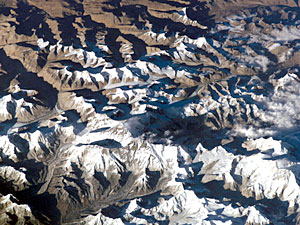 |
As world leaders gather at an environment summit in Durban climate change is once more in the headlines. Nepal is there in force with a 30-member delegation. The global recession has thrown the entire Kyoto Protocol process on reducing global warming into doubt.
Developed countries say they can no longer afford to clean up the carbon they have pumped into the atmosphere since the industrial age, backing down from pledges made at Kyoto to help poorer countries mitigate the effects of climate change. Large developing countries like China, India, Brazil and Indonesia see no reason why they should sign binding cutback commitments if the rich countries won't put their money where their mouth is.
For smaller Asian countries like Nepal, the issue is different. Whether we switch to renewables or not is not going to save the planet, but it can save us. Nepal's increasing dependence on fossil fuels is certain to take this country down the path of economic ruin. With the world heading for "peak oil" in 2020, after which total global petroleum extraction will start to fall, petrol, diesel, and aviation turbine fuel will not only be scarcer, but dearer.
The queues at gas stations this week should be a dire warning of the disasters to come. Nepal's petroleum imports from India grew three-fold in the last five years, and we don't have money to pay for it anymore.
As we have argued in this space before, Nepal's balance of payments gap with India is only going to grow in future making us even more dependent on the southern neighbour.
The solution is right under our noses. Making the switch to a hydropower-based economy is both the short-and long-term solution. We can give speeches until we are blue in the face in Durban about how the western countries should compensate us for our melting glaciers, or to help us adapt and/or mitigate, but if we don't have a plan to wean this country away from fossil fuels we might as well forget about it.
We don't expect Nepali politicians to get fired up about global environmental crisis which will start submerging coastal areas in 50 years time. They need a paradigm shift to start thinking of climate change not in ecologicial terms, but economic ones. We need to ensure that future generations of Nepalis (50 million of us by 2030) will inherit a country that is self-sufficient in domestically-generated renewable energy to meet their transportation, industrial and household needs.
Aside from that, there are some environmental steps we can take right away. The ICIMOD report released this week in Durban warns us of the accelerated decline in the mass balance of ice and snow in the Himalaya. As the snowline recedes and glaciers retreat, the Himalaya will be mostly rocks, and we might as well get used to that. However, this is not all caused by global emissions but from the deposits of soot from industries, biomass combustion and windblown dust on snowfields, reducing their albedo effect and accelerating melt. We can start by cleaning up our own smoke stacks and car exhausts.
In the coming years, climate change will exacerbate all other crises that Nepalis already have to cope with: flash floods, droughts, erratic monsoons, lack of irrigation, rivers going dry in summer, forest fires, to name a few. Bolstering their capacity to cope with these crises will better their resilience to climate change as well.
Maybe we should have just sent the minister to Durban to deliver his speech, and the rest of the delegation should have stayed home to plan for the future.
Read also:
Guns and nuns
The rat race, ANURAG ACHARYA
The parties are competing for their share of credit on peace and constitution


